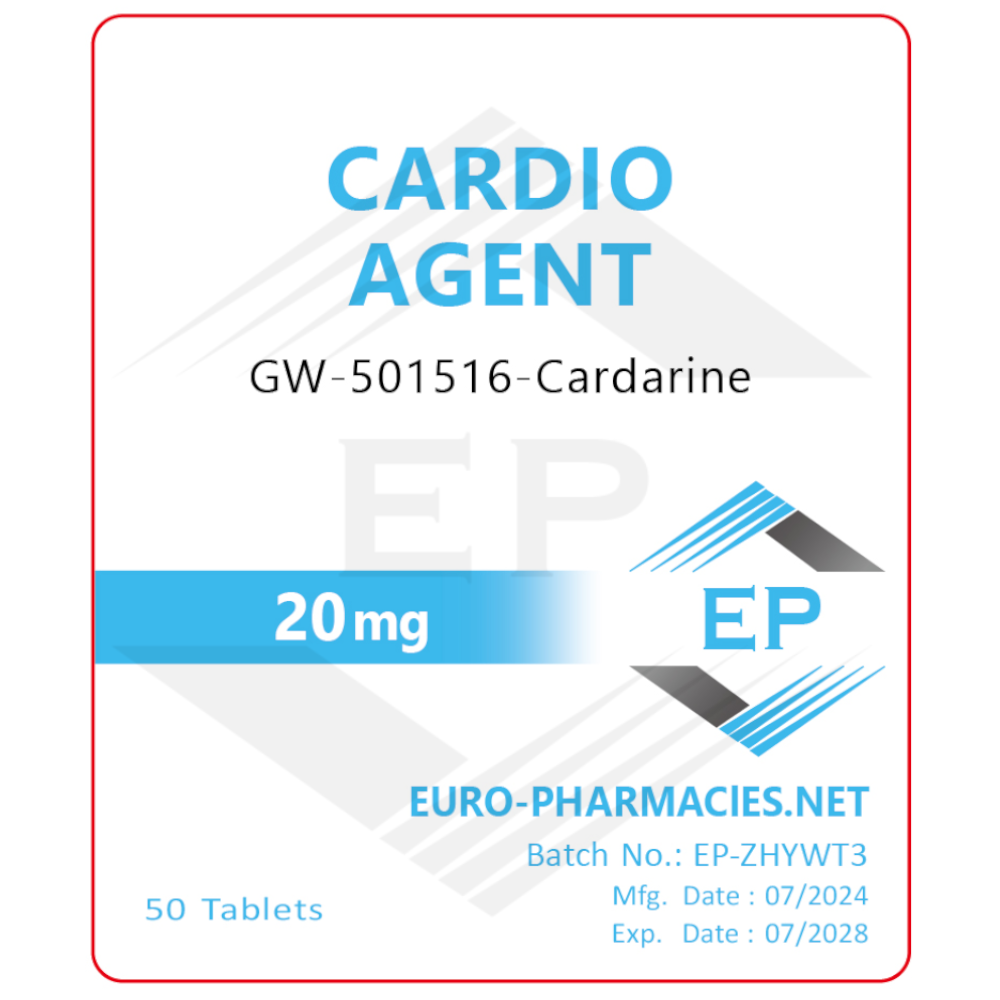Description
Cardarine (GW-501516) is an incredibly powerful supplement that holds a wealth of benefits for athletes. Let’s start by debunking the most common misconception – Cardarine is NOT a SARM. Instead of targeting androgen receptors, Cardarine operates on the PPAR pathway as a PPAR Receptor Agonist. This means that Cardarine is non-hormonal, non-anabolic, and does not necessitate a post-cycle therapy (PCT).
Peroxisome proliferator-activated receptor-delta (PPAR-δ) plays a crucial role in regulating essential cellular metabolic functions that help maintain energy balance. It is particularly vital in controlling fatty acid uptake, transport, β-oxidation, insulin secretion, and sensitivity (Liu et al., 2018). Initially, Cardarine was explored for its potential in managing obesity and type 2 diabetes, among other related conditions. However, further research was halted following the results of a rat study – but fear not, we will delve deeper into this intriguing topic shortly.
Benefits of Cardarine
Does Cardarine provide an energy boost? While Cardarine does not directly boost energy like a stimulant would, it can significantly increase endurance. This makes it an excellent choice for athletes such as cyclists, sprinters, and bodybuilders who are looking to improve performance and reduce recovery time between sets. Research has shown that when combined with four weeks of exercise training, Cardarine can increase running time by 68% and running distance by 70% in mice, leading to adaptations in skeletal muscle (Narkar et al., 2008).
Cardarine and Lipid Profile
The use of performance-enhancing drugs (PEDs) or poor dietary choices can negatively impact lipid profiles. It is recommended to address these issues before considering any supplemental interventions. However, Cardarine has been shown to have positive effects on lipid profiles. In a 12-week study, GW501516 was found to increase good cholesterol (HDL) by up to 16.9% and apolipoprotein A-I by up to 6.6%. Additionally, reductions were observed in bad cholesterol (LDL), triglycerides, apolipoprotein B, and free fatty acids. The study also showed significant reductions in very low-density lipoprotein, intermediate-density lipoprotein, and LDL concentrations, while the number of HDL particles increased (Olson et al., 2012).
In conclusion, Cardarine offers benefits in terms of endurance and lipid profile improvements, making it a valuable supplement for athletes looking to enhance their performance and overall health.
Cardarine and Insulin Sensitivity: Enhancing Sugar Control
Cardarine plays a crucial role in managing sugar control, making it a valuable asset for individuals during both offseasons and dieting phases. When adhering to a high-calorie, high-carbohydrate diet, maintaining high insulin sensitivity is essential to ensure that food is effectively utilized and to prevent the onset of prediabetes symptoms commonly experienced by intense bodybuilders pushing their limits during a growth phase. Conversely, when dieting, regulating insulin levels helps to sustain fullness and restrict fat storage. By shifting cellular energy utilization from glycolysis to fatty acid β-oxidation, Cardarine improves systemic glycemic control, positioning it as a potential tool for managing diabetes (Liu et al., 2018). It is plausible to consider Cardarine as a beneficial supplement to combine with berberine, such as the Hydrapharm Elixir, to enhance sugar control, optimize nutrient absorption, and improve overall body composition. The Elixir falls under the category of Glucose Disposal Agents (GDAs), offering a wide range of benefits beyond sugar control.
Cardarine and Inflammation: Regulating Inflammatory Responses
Cardarine also demonstrates potential anti-inflammatory properties, particularly in organs like the kidneys. Initial studies suggest that it may help reduce oxidative damage that naturally accumulates over time. However, the full extent of this relationship remains unclear, as Cardarine can exhibit pro-inflammatory effects in certain contexts.
Exciting Cardarine Diet Benefits!
One amazing benefit of Cardarine is its ability to regulate metabolism. By activating PPAR delta agonists, Cardarine increases fatty acid oxidation, meaning that fats are used as fuel for exercise instead of stored carbohydrates. This not only improves muscular endurance but also helps with body composition, making Cardarine a popular choice for those looking to burn fat.
But wait, there’s more! Cardarine also offers pressure benefits, particularly when it comes to hypertension. High blood pressure, often linked to obesity, stress, and AAS use, can be effectively managed with Cardarine. In fact, studies have shown that Cardarine can be beneficial in treating pulmonary arterial hypertension by inhibiting cell growth and preventing heart hypertrophy.
In conclusion, Cardarine is not just a fat burner, but a powerful tool for improving metabolism and managing hypertension. So why wait? Experience the incredible benefits of Cardarine for yourself today!


Reviews
There are no reviews yet.